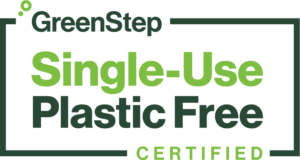Single-Use Plastic Free Certification
Single-use plastic items are typically used only once before they are thrown away, but take hundreds of years to break down. According to the Nature Conservancy of Canada, an estimated 3.3 million tonnes per year of plastic waste is produced in Canada, but only nine per cent is returned for recycling. This results in billions of plastic items ending up in our lands, oceans and rivers, which can be devastating to wildlife and ecosystems. Even worse, some disposable plastics, such as straws, bags, coffee sticks, food packaging, and water bottles, never break down completely, becoming microplastics that continue to pollute the environment.
What is Single-Use Plastic Free?
For the purposes of certification, single-use plastic free is defined as zero use of non-essential single-use plastic products. Single-use plastics are plastic items intended to be used only once before they are thrown away or recycled, such as bags, food packaging, product packaging, beverage bottles, containers, cups, lids, cutlery, coffee stirrers, straws, etc. Expanded polystyrene (commonly known as styrofoam) single-use products are also included in the definition of single-use plastics. “Plastic” is defined as a hydrocarbon-based material, including recycled plastic. Essential single-use plastic items are those that are necessary, such as for medical or health and safety purposes, and for which no non-plastic alternative exists.
GreenStep has categorized single-use plastic items into three primary types of plastic that may be found within business operations; direct, indirect, and other.
- Single-use plastics that are directly purchased for use within the operation
- Single-use plastic packaged products (e.g. water bottles, mouth wash, creamers, coffee pods, etc., packaged in plastic)
- Single-use plastic packaging that is used by suppliers, and included with purchased products (e.g. bubble wrap or styrofoam chips around ceramic mugs, overwap, etc.)
- Single-use plastic waste generated by customers and guests
- Single-use plastic waste brought into the business by employees
Plastic items that are not single-use, such as furniture, décor, pens, etc. These plastics are allowed, as they are not single-use.

The GreenStep Single-Use Plastic Free Certification includes the following requirements:
- No single-use plastic (except for essential single-use plastics)
- No new single-use plastic may be procured after the assessment
- Mandatory indirect single-use plastic recycling and waste management
- Reduction of indirect single-use plastic and non-single use plastics over time
Assessment and Certification Process
Phase 1
1. Initial assessment to identify types, sources, and quantities of single-use plastics
2. Waste policies and practices assessment
3. On-site walkthrough assessment
4. Request evidence and further information as necessary
5. Complete assessment report with required and recommended actions
Phase 2
For businesses wishing to pursue certification:
6. Business to implement any required actions (within 1 year)
7. Onsite verification of actions and final certification report with recommended actions for continuous improvement
8. Certification (valid for two years)
